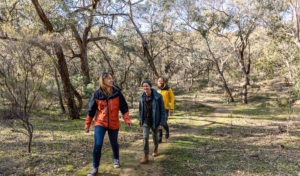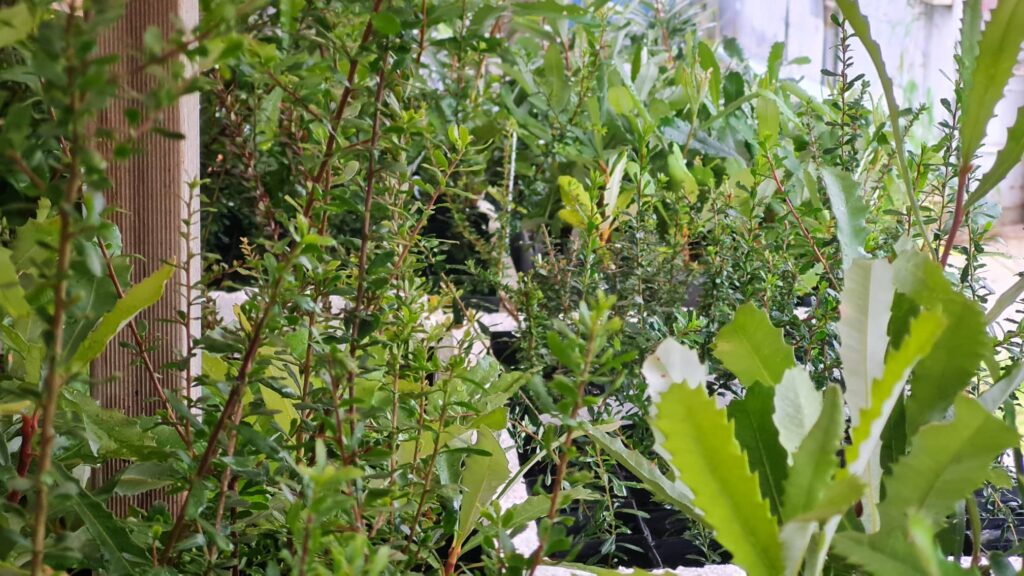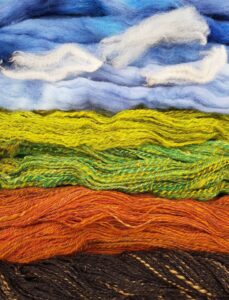Botanist, teacher, writer, and member of the Potawatomi nation, Robin Wall Kimmerer has a lot to say about ancient moss beings, who were the first plants to cover the Earth. ‘Mosses, I think, are like time made visible…The mosses remember that this is not the first time the glaciers have melted…’. Kimmerer points out that mosses document a passage of time that is not linear. ‘…the knowledge we need,’ she says, ‘is already within the circle; we just have to remember to find it again…’There are beings on this planet older by far than the human imagination. These ones await our apprenticeship, wait for us to turn to them and begin to breathe again. Four hundred fifty million years ago mosses travelled from the primordial waters and began a great experiment in evolution, as Kimmerer writes, ‘an experiment of which we are all a part, whose ending is unwritten.’Unwritten, because it is unknown. That’s where the mystery comes in, the acknowledgement that there is more to this world, to this life, than we know. There is knowledge more vast and deep than the torrent of information exploding out of our cell phones; there is a knowing far truer than our overwrought images. It is here all around us, greenly shimmering under the surface of things in this pandemic-ridden threshold, this new ground.Lindsay McLaughlin, Friends of Silence website, June 2022 https://friendsofsilence.net/
Welcome to the June edition of Localising Leanganook. In this edition you’ll learn about:
- Community Forum on Affordable Housing in Hepburn Shire
- Classical Guitar and Cello Concert in Yandoit
- Rooftop Solar Feasibility Tools
- Bush walk in Castlemaine
- Social and Affordable Housing Strategy Launch
- Committees Seeking Members – Reconciliation and Gender Equity
- Climate future plants arrive
- Home Energy Savings Workshop
- Winter Sounds Festival
- Logging in National Parks- Letter
- Expanded transmission lines through our region
- Ordering locally grown fruit trees
- Castlemaine Documentary Film Festival
- Championing Community power hubs
- Size Matters- community challenges large supermarket in Castlemaine
- Growing Abundance
- Support for solar on community buildings and businesses
- Lock the Gates to Gold Mining
- From Fibre to Fabric and beyond- Exhibition at Newstead
- Castlemaine Free University
- Place Based Capital Program
- Bird of the month: Long-billed and Little Corella
- Repair Cafes
- Supporting Creative Practice
- Landcare grants
- Wilderlands platform launched
- Earth-Centred Futures Online Course
- Planting brings back woodland birds
- Food for Thought: Planet Local – A Quiet Revolution; Walking Together towards Makarrata; Documentary encourages Repair- SCRAP
1. It takes a village- Community Forum on Affordable Housing in Hepburn Shire
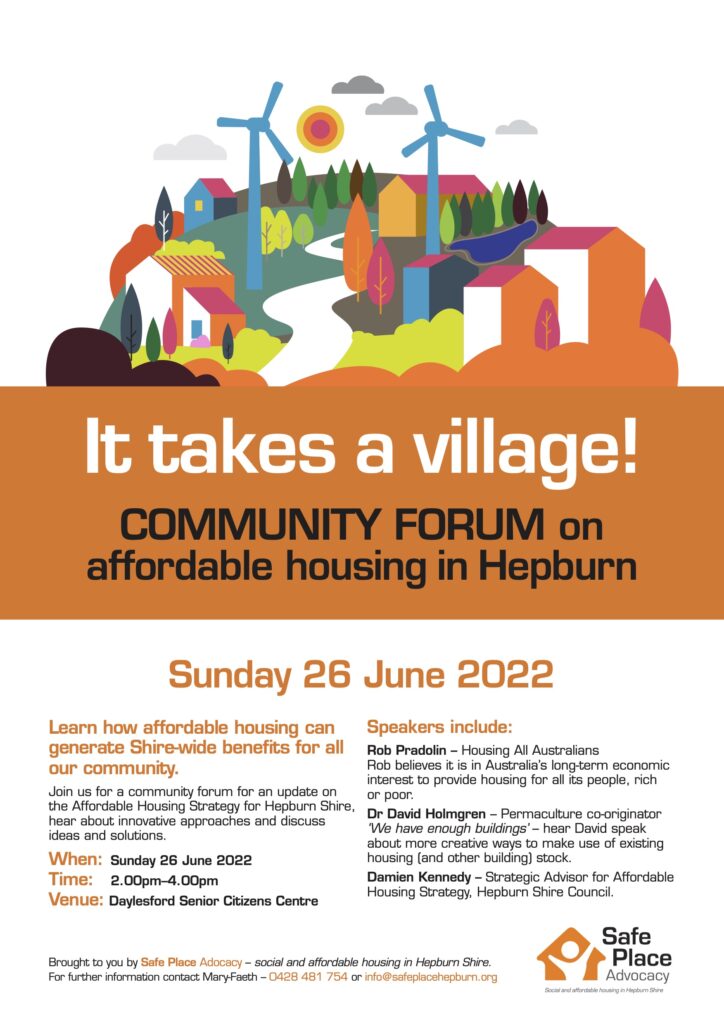
2. Classical Guitar and Cello Concert in Yandoit
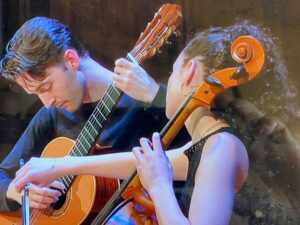
Come and enjoy a fabulous evening of live music with Darcy King on guitar and Ceridwen McGooey on cello on Saturday June 25th, 7pm at Yandoit Cultural- the old church in the bush- Uniting Church Rd, Yandoit.
You will hear a selection of classical, folk and original music, old and new, drawn from Australia, Latin America, Wales and elsewhere. Some of the original music will include Ceridwen’s latest collection- Conference of the Birds.
Both Darcy and Ceridwen have graduated with honours from the Conservatorium of Music (Melbourne University).Darcy and Ceridewn are generously donating this performance to support Yandoit Cultural- the Uniting church which is now a community cultural space and managed by the community.
Cost: By Donation (to help keep this beautiful church, with excellent acoustics, in community hands)
Tickets: contact Alison King (0415 555 081) or Nikki Marshall (0432 232 073)
When: Saturday 25 June at 7pm
3. Rooftop Solar Feasibility Tools
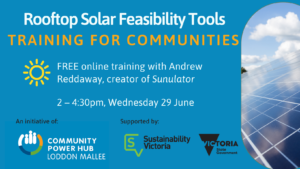
When: 2 – 4:30pm, Wednesday 29 June
Where: Online via Zoom (link will be sent in the week before the training)
Click here to book your place. Get in quick though, there are only 15 places! Once these are full, we will have a waiting list; we will contact you if a place becomes available.
Some experience with spreadsheets and some knowledge of electricity data is useful, but pre-course notes and a Sunulator file will be sent out in the week prior to the training. A Windows-based computer is ideal and Microsoft Excel is a must. To read more about about the tools: https://renew.org.au/resources/sunulator/
https://getpylon.com/
If you have any questions contact Melissa Abel (Project Manager): e: melissaa@bsg.org.au | p: 0421 704 064
The two walks will take approximately 2 to 2.5 hours in total. The tracks are quite rocky and slippery in places, so sturdy footwear is very important. Also, please wear suitable clothing, bring drinking water and snacks, and protect yourself from sun, mosquitos, wind and rain.
Register here: https://www.acf.org.au/june_2022_bushwalk If you register, we will have an idea of how many are coming so we don’t leave you behind if you are running late! Please include your phone number when you register, so we can call you if you haven’t arrived by 10.00 am or if there is a belated change. Friends and family are welcome but should register individually, as we like to have names and contact numbers for all participants. If you want to carpool from Bendigo, contact Philippe: 0400198375 or bonne.philippe1950@gmail.com
Photo: Parks Victoria
5. Social and Affordable Housing Strategy Launch

Organised by : My Home Network
When: Wednesday June 29th, 7-9pm
Where: Castlemaine Town Hall
The local My Home Network (MHN) are launching their 10 year social and affordable housing strategy next Wednesday 29th June 7-9 pm at the Castlemaine Town Hall
The Network’s Vision and Mission:
Our vision is for people in Mount Alexander Shire to have access to safe,affordable, secure, sustainable and appropriate housing that recognises their place in and connections to community.
Our mission is to support a strengths based approach in housing delivery and reform that is linked to community health and well-being, social inclusion, gender equality, Indigenous self-determination and climate change adaptation. Indeed part of a broader and deeper system change that builds a more equitable
society.
Underpinning this housing strategy is a whole-of government and community approach. We will embed values of collaboration, inclusion, innovation and learning, acting on lived experience and a commitment to best practice principles in housing design.
The My Home Network is a group of organisations and community members formed in 2019 in the Mount Alexander Shire. It all began with a Castlemaine Community House project to support local women to re-engage in waged work. The findings demonstrated that one of the predominant barriers to their re-
engagement in waged work was a lack of affordable housing. This instigated a community forum, bringing community members, lived experience of housing crisis, and various housing, community and government organisations together to discuss the housing crisis in Mount Alexander Shire. One of the
outcomes of the forum was the formation of the My Home Network.
6. Committees Seeking Members – Reconciliation and Gender Equity
Hepburn Shire Council has a number of community advisory committees which seek to provide community inputs for policy and strategic direction. These committees provide a mechanism for community voices to be included directly in local government decisions.
Two advisory committees are currently seeking community members: the Gender Equity Advisory Committee and the Reconciliation Action Committee.
Gender Equity Advisory Committee
Council established the Gender Equity Advisory Committee (GEAC) in 2021. The aim of GEAC is to provide Council with advice on improving gender equity within Council and the community. The concept recognises that people may have different needs and power related to their gender and that these differences should be identified and addressed in a manner that rectifies gender related imbalances. Council is now calling on applications from suitably qualified and experienced community members for vacancies on GEAC. Applications close Friday 8 July 2022. For those interested in applying, read the Terms of Reference, and apply through the GEAC webpage. For enquiries, please contact customer service 5348 2306.
Reconciliation Advisory Committee
Hepburn Shire’s Reconciliation Action Plan is a 12 month business plan outlining what the organisation will do within its sphere of influence to contribute to reconciliation. The plan is based around three key areas of action: Relationships, Respect and Opportunities. Council is calling for expressions of interest from community representatives to serve on the Reconciliation Advisory Committee (RAC). The RAC provides a forum for Hepburn Shire to consult key stakeholders and seek advice regarding the process, development, and implementation of the next Reconciliation Action Plan.
7. Climate future plants arrive
Connecting Country extends a warm welcome to our 1,000+ recent arrivals of Silver Banksia and Sweet Bursaria plants. The plants have arrived from locations all over southeastern Australia, as part of our ‘Future-proof our forests’ project. In 2021 Connecting Country secured funding support from the Ross Trust to establish two climate future plots of 500 plants each, right here in Mount Alexander region during 2021-23.
We are focusing on two species from our local area, Silver Banksia (Banksia marginata) and Sweet Bursaria (Bursaria spinosa). Both are key species for our local woodlands and landscape. We have sourced a variety of plant provenances of these plants, from local populations as well as some from further away. We started by looking at the Bureau of Meteorology’s climate predictions for our region and selected seed from areas that are anticipated to match our climate into the future, focussing on areas that are hotter and drier.
However, we also included seed from areas that are cooler and wetter. We aimed to to include genetics from a wide range of environments, as we don’t know what will be important in the future. There may be other genetic information stored within a particular provenance, such as the ability to survive an insect attack, or frost resilience, which plants from the hotter and drier area do not have.We then paired these predictions with species distribution and the availability of seed or plants, to make our final plant selection.
Connecting Country’s Landscape Restoration Coordinator, Bonnie Humphreys, said ‘The aim of our two climate future plots is to create seed production areas and provide climate-adapted seed for use in future revegetation projects. They may also help us identify provenances most suited to survive in our changing climatic conditions’. ‘We are excited to have reached the stage of planting at the climate future plots, and look forward to watching them grow over and monitoring their progress over coming seasons,’ said Ms Humphreys.
The plants will be delivered from the depot to the climate future plot sites in the coming weeks, and guarded by sturdy wire plant guards. Each plot has been carefully set out to allow tracking of each plant into the future. Mixing up provenances within the plot will increase the likelihood they will share pollen between plants when they flower and reproduce. This sharing of this genetic information may help the plants adapt as our climate changes. Once the plants are established, monitoring will allow us to assess plant growth and success.
Stayed tuned for more updates once the plants are in the ground and protected with plant guards. We will be holding a tour of the climate future plots in coming months. Learn more about climate future plots: For more information on climate future plots, see:
- https://www.greeningaustralia.org.au/climate-future-plots/
- https://connectingcountry.org.au/what-is-a-climate-future-plot/
8. Home Energy Savings Workshop
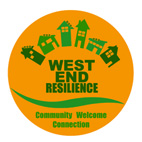
What , When and Where: FREE 2 hour workshop: Sunday July 31st, 2 – 4pm at the West End Hall, Castlemaine
Join the West End Resilience Energy Group and guests for the following session:
Understanding your Energy Bill
- Where does my energy come from? Why does it matter?
- How to understand your bill and your consumption data.
- Choosing a retailer. What should I consider? (Including the Power Saving Bonus Program)
Basic Intro to Home Energy Efficiency for Everybody
- Energy Efficiency in Context and Energy Basics – Why would we want an energy efficient home?
- Appliances and Efficiency – Heating, cooling, hot water systems, and lighting
- Building Shell Efficiency – Draughts, insulation, windows – practical tips and demonstrations
We encourage participants to bring along a recent power bill that they can practice interpreting.
There will be physical examples of draught-proofing materials, insulation, and external blinds etc, and the latest information about rebates for energy efficient appliances and upgrades. ALL WELCOME! Any questions / further info: Email ilkajanewhite@gmail.com
9. Winter Sounds Festival

The inaugural Winter Sounds music series will finally take place this July in Daylesford, delivering an all-Australian music lineup and plenty of country charm.
Winter Sounds takes place from 15 to 17 July across a variety of venues in Daylesford and surrounds. Tickets and a full program are available now from wintersounds.com.au.
Produced by the team behind the award-winning Riverboats Music Festival in Echuca, Winter Sounds will see a lineup of top Australian artists perform at some of the Daylesford region’s most atmospheric and character-filled heritage venues over three big music-filled days running from 15 to 17 July. Kicking off on Friday 15 July with the sublime sounds of award-winning soul band Emma Donovan & The Putbacks and support from Fenn Wilson at the Daylesford Uniting Church, the three-day event will see five separate performances hosted at a mix of truly unique historic sites across the Daylesford region.
Director David Frazer says that each of the five performance spaces –– a charming mix of old churches and Gold Rush-era halls –– will offer audiences a chance to be transported to a different time and place for a set of intimate and extraordinary musical experiences. “Winter Sounds will bring some of Australia’s best-loved performers to Daylesford and surrounding hills while drawing attention to some of the region’s most beautiful and sometimes forgotten heritage buildings. With this unique combination of talent and atmosphere, we’re hoping to deliver a really special set of experiences for our audiences.”
On Saturday 16 July, rockers Cash Savage & The Last Drinks will play a matinee performance at the wonderfully quaint, 100-year-old Bullarto Village Hall with support from The Peep Tempel’s Blake Scott; while Saturday evening will see internationally celebrated bluesman C.W. Stoneking take to the grand Daylesford Town Hall stage supported by Harmony Byrne. On Sunday 17 July, Melbourne alt-country legends The Luke Sinclair Set will perform at the 1890-built Glenlyon Town Hall supporting cosmic country star Freya Josephine Hollick, and the series will culminate with an afternoon performance by high energy seven-piece soul-jazz ensemble Jazz Party at the superb Palais Hepburn Theatre.
Audiences can choose to purchase tickets for one or all of the five performances, while enjoying local wine and food in dedicated pop-up bars at each of the venues.
10. Logging in National Parks- Letter
LOGGING IN A CLIMATE EMERGENCY IS AN EXISTENTIAL THREAT
“In the same week that the Victorian government announced permanent protections for Victoria’s three national parks, it also flagged new penalties for anti-logging protesters” wrote Angela Crawford in “Stakes high for forests” Midland Express 31st May ‘22. The irony is that at the same time as the government is offering this protection, it will not happen until 2030, and in the meantime Vic Forests, under the guise of “a recovery plan for the Wombat State Forest,” is flat out removing hundreds of trees. To log old growth forest in a climate emergency, to destroy the life blood of the planet when we are trying to curb global warming is madness, and it beggars belief that the authority put in charge of our forests could be so stupid; not to mention that by the time the area is declared a national park, a large proportion of the forest, including habitat for threatened species, will be gone. What happened to the Vic Forests plan to grow plantations, so that there would be a sustainable supply of timber and pulpwood? To log old growth trees for paper is an inexcusable act of environmental vandalism. According to Angela, there has been a number of local activists who care deeply about the forest and the creatures that live in it, and who have been campaigning for more than two decades to save it. They are convinced that this is much more than a “recovery plan”. So it is shocking to hear, that if they continue with their efforts, under these new laws they are likely to be fined up to $21,000, or go to jail for at least 12 months. Local State member for Macedon and Victorian minister for agriculture, Mary-Anne Thomas, always quick to say that she supports climate action, now says that protests are becoming increasingly dangerous -particularly for workers, and that this legislation is needed to minimise disruption to the industry, but she doesn’t mention that the workers have been misled by Vic Forests and should not be logging old growth at all. Virtually all scientists agree that if we aim for net zero emissions by 2050, the emissions will have reached a level that will cause global heating greater than 2 degrees C, which will have catastrophic consequences for our climate; think the unimaginable – more frequent and more severe droughts, cyclones, floods and unstoppable bush fires, and all the threats that they would bring to our shores.
Trevor Scott, Castlemaine Trevorscott3@gmail.com
1 1. Expanded transmission lines through our region
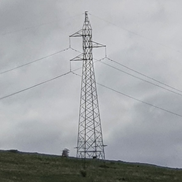
Since the early 1960’s a 220,000 volt powerline has traversed Werona, Yandoit Hills & Clydesdale as well as other locations in central Victoria on its route between Ballarat to Bendigo. In 2019 the market operator (AEMO) determined that Victoria needs a stronger power line to NSW (VNI-WEST) & affirmed that the (yet to be built) Ballarat North & Bendigo Substations are on the preferred route. The Ballarat North substation placement and powerlines are being challenged by Hepburn and Moorabool resident groups (including Piss off Ausnet).
The proposed route for the new line will most likely follow the existing powerline easement & this will be determined over the next few years. The line is schedule for construction from 2029-32. The new towers will be massive, up to 80m tall & will carry 6 conductors (the existing towers are 35m tall with 3 conductors). More info on AEMO website: https://tinyurl.com/Yandoittowers. Email Richard Johnson, who lives in Yandoit Hills, if you want to be kept up to date on developments: Richard.johnston@jouleadvisory.com
12. Ordering locally grown fruit trees
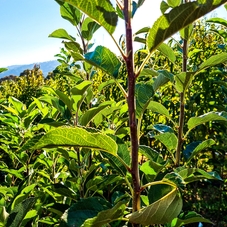
Katie, Liz, and Merv from Carr’s Organic Fruit Tree Nursery in Harcourt, have fruit trees for sale including a variety of apples, apricots, cherries, nectarines, peaches and plums. You’ll need to act quickly before they are gone.
For more information email: carrsorganicfruittrees@gmail.com
13. Castlemaine Documentary Film Festival
When: July 1st – 3rd, 2022
Where: Theatre Royal – 30 Hargraves St, Castlemaine
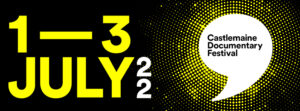
REAL STORIES. REAL ISSUES. REAL CHARACTERS. REAL CONVERSATIONS.
LOCALS – the Opening Night, is taking advantage of what our region has on offer – an abundance of local regional talent. It’s a fun time to dip in and discover some of the things that inspire and energize our locals- a splendid array of creativity. We hope everyone will be as surprised as we were! And we hope everyone will come join us, and stay on for VibeMaster. It’s the perfect way to kick off the festival weekend: 1st – 3rd July. The chance to revel together as we see some of what our locals get up to ! You are guaranteed a fun time. Also we’ll need your vote for the inaugural LOCALS Audience Favourite Award – with the Winner and Runnerup’s announced on the evening when we take a short break during the music.
We went on an intense, wonderful hunt for films which turn the lens of human experience on to the themes and issues at the heart of what we do and why we do it. We were determined to make each program offering distinct, in order to create a broad gathering together of creative and invigorating storytelling – and finally bring to fruition the additional screen-based surprises we’ve been planning.
This year’s Realise The Possible celebrates the connection between filmmakers, films and audiences and the lure of documentary storytelling with a diverse line-up of eight outstanding documentaries, stimulating panel discussions, conversations and parties. Films are also available online.
THE STONE SOUP KITCHEN
Over the weekend you won’t have far to go for your sustenance between the films – The Stone Soup Kitchen ( Castlemaine Community Garden & Kitchen) will be in the Theatre Royal Courtyard providing hearty soups and good bread to festival –goers and it’s open to all-comers. Never heard of the Stone Soup parable? It goes like this: a starving traveller comes to a little village, so poor it’s inhabitants never shared a morsel of the little food they have. So the hungry traveller borrows a big pot, fills it with water and puts it over a fire in the village square – and drops into it a smooth stone.
A villager wanders up to see what’s cooking and the traveller offers him a taste, saying the stone soup was nearly done but it could do with an onion. “I’ve got an onion,” the villager says – and adds it to the pot. Then along comes another villager with two scrawny carrots … and so it goes until there’s a huge pot of soup which the whole village share – and give the stone back to the traveller when he leaves.So between films, share a soup with us: it’s a well-known fact that Castlemaine stone is particularly tasty.
For more information go to: CDOC WEBSITE
14. Championing Community power hubs
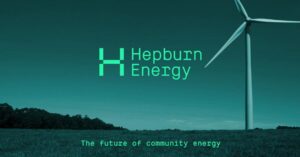
Hepburn energy is inviting residents to Sign on to the Community Power Hubs letter today to help save this critical program. Join the call for the State Government to champion Community Power Hubs and commit to baseline funding.
The Victorian State Government has been a leader when it comes to community participation in our energy system. A key centrepiece of this agenda is the Community Power Hubs program that empowers local people to grow renewable energy, promote energy independence and build resilience. Better still, this program skilled up local organisations across Victoria, giving them the resources they needed to build trust and support real projects on the ground.
Hepburn Energy has benefited from this program, delivering the “Hepburn Branch” of the Grampians Community Power Hub. With these additional resources, we were able to facilitate solar, batteries and energy efficiency for community facilities and a heat pump hot water bulk buy. This is just a small part of what this program has delivered so far. From Bendigo to Ballarat, the Latrobe Valley and Mornington Peninsula, this program is helping communities skill up, create their own solutions and be part of the transition to renewable energy.
But the 2022 state budget has left community energy groups out to dry, with no future baseline funding for the Community Power Hubs. This has put many community-led energy projects in free fall and left our state’s energy transition up to big energy companies rather than community leadership. That’s why we’re calling on the Energy Minister, Lily D’Ambrosio to champion Community Power Hubs and make sure that the state government commits to this essential program. Sign on to the letter today!
Thanks to Friends of the Earth and the Coalition for Community Energy who are leading this campaign.
15. Size Matters- community challenges large supermarket in Castlemaine
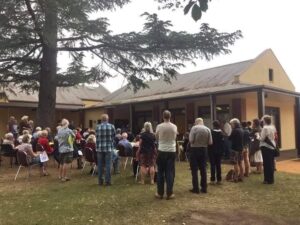
Concerned residents of Castlemaine have gathered together to object to the size, scale, urban planning and traffic implications of the application for a larger supermarket—3,300 sqm plus approximately 420 sqm for two retail shops- fronting onto Forest Street. The Group are not objecting to a third supermarket in Castlemaine- a permit for a third supermarket was granted by Mt Alexander Shire Council in April 2018.
The matter is being addressed by VCAT. Proceedings started in March, with two weeks of presentations. An additional week has been set aside from July 4th 2022. Eleven individual objector respondents to the proceedings lodged submissions with VCAT.
To be physically viable the developer needs to subsume public land at the southernmost end of Urquhart St (to become part of the car park) and a road reserve/right of way between 2a Duke St and 2 Duke St (to become the loading bay). Without this acquisition of public land the larger development as currently proposed does not fit onto the proposed site.
To date, respondents have presented to VCAT that the proposed loading bay of the development off Duke St and the entrance and exit points on Forest St will create significant traffic snarls from approximately the Castle Motel through to Barker St, inbound and outbound. The group has highlighted the risk that traffic will seek relief for this congestion by using the residential road network around e.g. Andrew St, Mostyn St and back onto Urquhart St, and, similarly, inbound traffic can seek to avoid the newly signalised intersection at Forest St and Urquhart St by turning left into Railway Avenue and right into Britton St, to name a couple of examples.
This congestion is predictable from the projected influx of shoppers from the surrounding communities of McKenzie Hill, Campbells Creek, Guildford, Newstead, Muckleford, Maldon, Wesley Hill, Chewton, Taradale, Elphinstone, Barkers Creek, Harcourt and Castlemaine itself, i.e. those who are no longer going out of town to do their shopping. We have also argued that a Road Safety Audit (RSA), which takes into consideration the interests of all road users, is so far absent from the developer’s application. The RSA is a Department of Transport requirement and involves an independent, formal examination of the proposed project’s accident potential and road safety performance. Duke Street and Forest Street are roadways built to service traffic in a small town. There is no adequate provision to adapt them to accommodate safe access and egress from a supermarket the size of the proposed development and the vehicle movements it will generate.
Other submissions focus on aspects of the Mount Alexander Shire Planning Scheme and the associated Design and Development Overlays: DDO15 which applies to the eastern portion of the proposed site and DDO7 which applies to the western portion. Objectors believe the proposed design does not achieve the design objectives of these Design and Development Overlays. Numerous requirements for buildings and works in both overlays are either disregarded or insufficiently applied. The proposal disregards many requirements governing building configuration and setbacks, site layout and car parking design, access and movement, which are needed to promote integration with the commercial centre and good urban design outcomes on this ‘gateway’ site.
Objectors will continue to make presentations to VCAT and expert witnesses will be called and cross-examined by legal counsel. As a group of individual objector respondents are not legally represented but have the right to cross-examine and/or to make a right of reply at the end of proceedings.
16. Growing Abundance
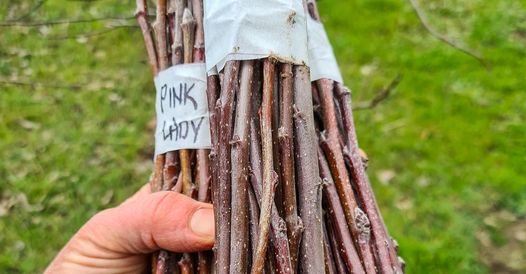
It is well and truly winter and bounty is not plenty, but it is potent. At Growing Abundance this month a bunch of volunteers came out to Guildford to pick plenty of plump olives from a beautiful grove. We have been processing those olives using a variety of different methods and will end up with bucket loads to share! Our pruning workshop with the Orchard Keepers at Harcourt Organic Farming Cooperative was a success for those that came. Katie from Grow Great Fruit shared so much knowledge and the Co-op lunch was delicious!
Whats happening next?
Great news! Our ‘Grow What When’ calendars have been printed and are available for purchase! Click here to purchase or find out more info. Thanks so much to the Hub Plot in Castlemaine for sponsoring the printing.
We are still looking for any excess fruit to harvest! Do contact us if you have any excess lemons or fruit that you need help picking and distributing.
It’s pruning season! If you are a fruit tree owner or are interested in learning more about caring for them, have a look at ‘Grow Great Fruit’s website. It’s packed full of great information and access to short courses to get you started on fruit tree care. And if you missed out on our pruning workshop with the Orchard Keepers this round, have no fear. We are planning to hold more events in the near future to get people skilled up and pruning. So stay tuned and stay in touch!
hello@growingabundance.org.au or go to the website https://www.growingabundance.org.au
17. Support for solar on community buildings and businesses
An initiative of Community Power Hub Loddon Mallee

Did you know support is available to fund solar for your community building, business, or facility?
Bendigo Sustainability Group & Community Power Hub Loddon Mallee stand for clean energy, owned locally for the benefit of OUR region. They are available & willing to support groups & individuals to realise solar power on their facilities.
To learn more & take action you can attend a Community Discussion Online via Zoom this Thursday evening:
If you cant get to the workshop you can find more information on clean energy benefits & the support subsidies & funds available, visit www.bsg.org.au/solar or contact Bendigo Sustainability Group: 03 54435244 | hello@BSG.org.au | www.bsg.org.au/contact
18. Lock the Gates to Gold Mining
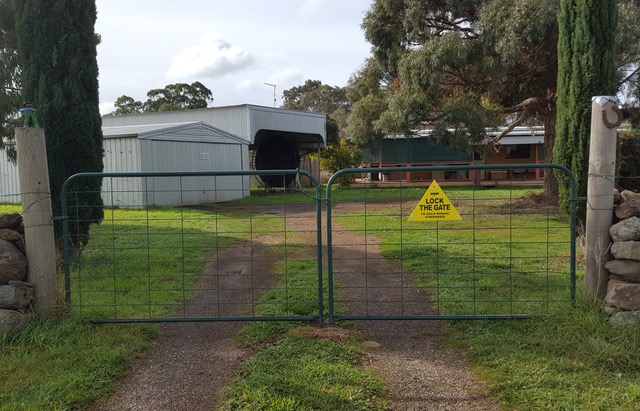
Locals around Victoria, including concerned residents living in and around Hepburn, Mt Alexander shires as well as greater Bendigo, have banded together with the support of Friends of the Earth and formed the group: Alliance for Responsible Mining Regulation. Lock The Gate signs are available to put up on your gate or fence at a cost of $5.00. Email Debra at: hello@nominingyandoitregion.com or John at: johnlewis@arcimedia.com.au
19. From Fibre to Fabric and Beyond- Exhibition at Newstead
By Newstead Spinners group
From Fibre to Fabric and Beyond illustrates how natural fibre is transformed to create a range of fabric types for functional, expressive and decorative purposes. Enjoy demonstrations of fibre preparation and various fibre crafts including fibre preparation, spinning, dyeing, felting and weaving by members of Newstead Spinners. Your chance to view and participate in these activities and purchase beautiful hand-made items.
Open: Weekends from June 4th to 26th at Newstead Arts Hub, 8a Tivey St, Newstead
ABOUT NEWSTEAD SPINNERS
Newstead Spinners Group began 45 years ago as an informal gathering of interested fibre crafts people. Friendship and an open sharing of skills and curiosity about all things fibre, have been at the heart of Newstead Spinners ever since. Not all who join the group spin yarn, but all love to create using mostly natural fibre of various kinds.
Newstead Spinners regularly have workshops, have a library of fibre craft books and members can borrow equipment owned by the group for that purpose. We meet every second Tuesday at the Newstead Community Centre from 10.30 am to 3 pm. Visitors are welcome. Contact: Sally 0400 922 027.
20. Castlemaine Free University
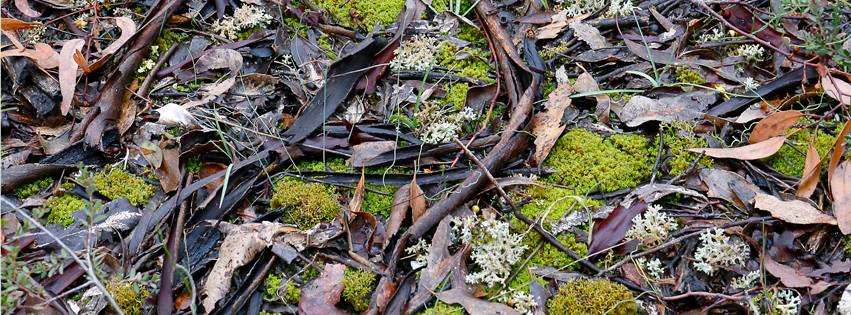
Next event: Monday August 1st, 7-9pm, at Northern Arts Hotel, 359 Barker St, Castlemaine Mount Alexander: Connecting Country and Friends of the Box–Ironbark Forests and Landcare
Friends of the Box–Ironbark Forests (Mt Alexander Region) is a community organisation advocating sound ecological and Indigenous management practices to conserve vegetation and associated wildlife on private and public land. See their prolific publications — www.fobif.org.au/
Likewise Connecting Country is a community organisation educating, monitoring and actively restoring landscapes and habitat for local plants and animals across Mt Alexander, including through Landcare. Over 200 landholders and community groups have been restoring more than 10,000 hectares in the past 15 years — www.connectingcountry.org.au/
Speakers are: Newstead resident and ecologist Asha Bannon is a FoBIF committee member, was a Landcare Facilitator and is a volunteer with Connecting Country. She is particularly interested in wildlife conservation and community engagement. Guildford resident Hadley Cole recently joined Connecting Country as Landcare Facilitator for the Mt Alexander region having worked in various environmental management and conservation roles with government and non-government organisations. Inaugural member of Golden Point Landcare, Marie Jones has spent years on the Natural Resource Management Committee of the North Central Catchment Management Authority, and on both Connecting Country’s Management Committee and the FoBIF Committee since their inception.
FREE with drinks at bar and publications for purchase
Castlemaine Free University: For details and subscribing to our e-list — https://anitranelson.info/cfu
21. Place Based Capital Program

Local councils, development authorities, NGOs, community and other interested parties are invited to participate and/or partner in the Place Based Capital Program.
- Does your region have local development and investment opportunities but you struggle to secure the capital to deliver them?
- Are you tired of applying for temporary and ad-hoc grant funding and philanthropic donations?
- Would you like a more permanent source of capital and an investment vehicle that’s owned and led by your region and understands and values the development and investment opportunities?
After 12 months of consultation and co-design with local community, business and government across Australia, Ethical Fields in partnership with The Yunus Centre – Griffith University present the Place Based Capital Program – creating local wealth, investment self-reliance and resilience.
“Local regions and communities are eager to make a difference and invest in their region. They report that there are strong development and investment opportunities in their local area. However, to capitalise on these opportunities, they require locally aligned capital. Beyond capital, they also desire more control and influence over local capital, economic and development activity. They would like to ensure the benefits of this activity flow back into the hands of local people and organisations” Meaghan Burkett, Director Community Wealth Building
The Place Based Capital Program (Proof of Concept Phase) will bring together a group of representatives from local places and regions across Australia to to design a local investment system and structure so that local places, businesses and councils have access to a dedicated and reliable source of capital to invest in local development and investment opportunities – place based capital. The program builds on the learnings and challenges of others that have tried to establish a local investment vehicle alone, by exploring and designing options that utilise collaboration, aggregation and/or mutualisation with other local regions across Australia to achieve economies of scale and access to larger forms of capital.
By the end of the program, and having worked together through the process, the goal is for the group to create a ready to build solution, effective partnership, mandate and the collective ability to engage the stakeholders and resources required to establish place based capital in their regions and across Australia. The program adopts a collaborative and co-funded model bringing together interested places and regions from across Australia to work together through a facilitated and structured process. This delivers significant value for your investment and enables your region to:
- Develop valuable relationships and a community of practice with like-minded regions and peers to support your journey
- Learn more and achieve more together than you could alone
- Receive the outcomes and outputs for a fraction of the total cost
- Be in a stronger position to move forward with your place based capital goals
We invite your region to be part of this program and community of practice.
For more information: Download the proposal for the Place Based Capital Program here.
Contact us at https://ethicalfields.com Or join our information sessions about this program. Reserve your seat here: https://bit.ly/PlaceBasedCapital
Places are limited. Registrations close 8 July 2022
22. Bird of the month: Long-billed and Little Corella
Welcome to our 26th Bird of the month, a partnership between Connecting Country and BirdLife Castlemaine District. Each month we’re taking a close look at one special local bird species. We’re excited to join forces to deliver you a different bird each month, seasonally adjusted, and welcome suggestions from the community. Thanks to Damian Kelly and talented Jane Rusden from BirdLife Castlemaine District writing about our next bird of the month, accompanied by their stunning photos.
Long-billed Corella (Cacatua tenuirostris) and Little Corella (Cacatua sanguine)
The story of Corellas in Australia is one of boom, bust and boom. And along the way some hard lessons have been learnt about misguided control measures that had exactly the opposite impact to what was intended.Back in 1878 in the Kimberley in Western Australia one estimate put a flock of Little Corellas at 50,000 birds. The noise of their calls was unbearable as anyone who has been close to a flock would appreciate. Many very large flocks have been recorded across various parts of the inland.
The Little Corella has been used as a reliable guide to the presence of water by both the local Aboriginal groups and the later European settlers. Little Corellas are seldom found far from permanent water sources as they drink each day and occupy communal roosts near water in wooded farmlands, tree-lined water courses and nearby scrublands. Unlike northern Australia, in Victoria Little Corellas were first recorded in the dry north-west of the state in 1951. Steady expansion of their range occurred so that by the early 1970s flocks were common throughout the north-west. By 1978 they were recorded near Melbourne, probably assisted by accidental or deliberate releases of captive birds.
First records in Tasmania were in 1982, most likely from releases of captive birds. They experienced a spectacular spread in South Australia from the 1950s. Little Corellas have adapted with ease to the changing environment of farms throughout inland Australia. Right from the early days they were kept as pets partly because they they are good talkers. There are even early records of some birds speaking in local Aboriginal dialects. They will readily breed in captivity and are also known to hydridise with Galahs and Pink Cockatoos in captivity. Hybrids with Galah have also been recorded in the wild. Long-billed Corellas originally were generally confined to south-eastern Australia. However, feral populations are now established in all states. They prefer wetter habitats compared to the Little Corella.
Long-billed Corella in the wild displaying the very long bill, pink face and stripe across the base of the neck (photo by Damian Kelly)
As a salutary lesson in messing with nature, in the early 1970’s large numbers of Long-billed Corellas were trapped by government agencies in grain growing areas. These birds were then sold into the pet trade. However, these wild birds proved to be totally unsuited to being pets and many were subsequently released, adding to feral populations. This impact of human intervention has only served to aid the spread of the birds. Big flocks continue to cause damage to crops in many areas as well as big roosting groups denuding their roost trees. Life expectancy for both species is around 20 years with some individuals living much longer. So once a mob is established in an area they will be around for a long time.
Jane Rusden on captive rescue Corellas
Interestingly, Damian’s research lead us to the realisation that my sweet aviary rescue bird, ‘Bird’, may well have been one of the Long-billed Corellas captured in the 1970s. His language indicates he’s about that age … I won’t enlighten you on his full phrase, but ‘grouse’ is the cleanest word, a word commonly used in the 1970s. Also, his leg band indicates he was taken from a nest during a cull. Both Corella species are very long lived – 70 years is expected, hence they often outlive owners. This can be a problem as they are very emotional birds who can become very attached to their humans. Their needs are much like those of a human child, but they also have distinctly bird needs as well. If these are not met by their owners, it can lead to a miserable, and sometimes aggressive bird. They are intelligent and crafty. Bird is an excellent escape artist, requiring padlocks on his aviary, which he can open if a key is left in them. ‘Chookie’ is my Little Corella aviary rescue. He is charismatic, loving, has amazing language, and is very adept at undoing quick links. He bites with pressures over 300 pounds per square inch (PSI). Despite trying, I can’t meet his needs and have the physical scars to show for it. He is about to join a large aviary flock, where we hope he will be happier with a mob of his own kind.
Posted by Connecting Country: https://connectingcountry.org.au/
23. Repair Cafes
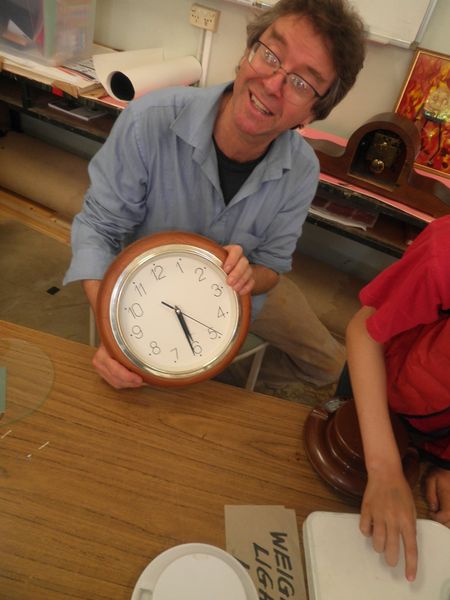
24. Supporting Creative Practice
What: Professional Development workshops for Artists at Goods Shed Arts . Skills, Structure and strategy to support creative practice. A series of six two-day workshops over the course of 2022, providing essential inspiration, skills and support for artists of all descriptions, who are forming, sustaining or rethinking their professional practice. Each workshop is stand-alone; commit to the whole program for a significant discount. Workshops happen on Thursdays and Fridays from 10 am to 3 pm with lunch provided.
Cost: $300 per 2-day workshop or $1200 for the whole series of 6. Book your sessions here or read below for all the details.
Venue: The Goods Shed, Kennedy Street, Castlemaine
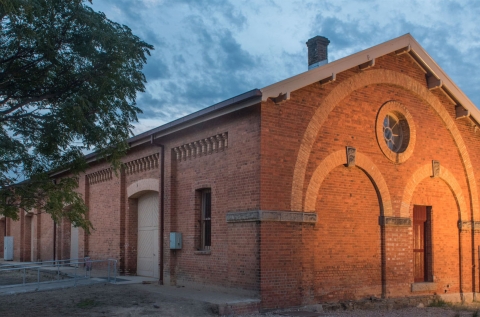
WORKSHOP ONE: Creative Visioning – Knowing yourself, working with others & planning to sustain your practice – 13-14 July, 10 am-3 pm.
In this workshop, you will develop your values and vision to create a foundation for your practice. That vision will be formed into a sound strategy that can sustain you, including looking at income streams and self-care. On day two we will explore the principles and practice of collaboration – working with others is an essential aspect of arts practice. Facilitator: Lucy Mayes with guests Kate Stones, Bob and Heather McNaught. Panel discussion on collaboration: Reece Hendy, David Hughes, Hermione Merry. BOOK NOW
WORKSHOP TWO: Creating Digital Content One – Photography, Video & Audio- 11-12 August, 10am-3pm
Creating digital content is an essential skill for artists, whether it’s documenting your work or creating an online workshop, or providing ‘self-tape’ video auditions. During the workshop, you will have the opportunity to refresh or create your own headshots with our professional photographers. Facilitator: Leonie Van Eyk. BOOK NOW
WORKSHOP THREE:Creating Digital Content Two – Editing Principles & Techniques- 15-16 September, 10am-3pm
With your intimate connection to your practice, it can be challenging to select the material from your body of work that shows you at your best. This workshop will cover key editing principles and techniques for stills, video and sound. How to kill your darlings, without making too much of a mess! BOOK NOW
WORKSHOP FOUR: Your Online Presence- 13-14 October, 10am-3pm
In this workshop, you will explore creating your own website with applications such as Square Space and WordPress. The workshop will cover the importance of understanding how to use Social Media effectively, combining different platforms, interacting online, and online safety. Facilitator: Jess Grant BOOK NOW
WORKSHOP FIVE: Delivering Effective Workshops-3-4 November, 10am-3pm
Delivering workshops is an essential skill for artists who want to operate in the professional sphere. Many residences and touring opportunities require artists to deliver community workshops of some sort. It’s one thing to know your stuff, but different skills come into play when you create an engaging and rewarding learning experience for groups of all ages. Over the course of the workshop, we will work together to create workshop plans based on your practice. Facilitator: Kate Stones.
WORKSHOP SIX: Business & Administrative Skills- 1-2 December, 10am-3pm
Get your head around the business and financial skills such as negotiating and contracting, doing a realistic budget, identifying funding opportunities, organising an auspice, making sure you get paid, invoicing, tax and legal issues. The pointy end!
25. Landcare Grants
2022 Victorian Landcare Grants are NOW OPEN.
Here’s the Ministers media release: https://www.premier.vic.gov.au/victorian-landcare-grants-and-junior-grants-now-open
For all current Victorian Environmental Grants, visit: https://www.environment.vic.gov.au/grants
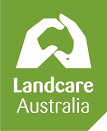
VLG Grant Round details:
- Project Grants can be up to $20,000
- Support Grants up to $500
- Applications need to be made online via SmartyGrants
- It is essential you read the guidelines and talk to the Regional Landcare Coordinator about your proposed project to ensure your organisation and activities are eligible.
- Applications need to be in by 5pm Tuesday July 26 (6 weeks away)
For the guidelines and application links visit: Landcare | North Central Catchment Management Authority (nccma.vic.gov.au)
Junior Landcare and Biodiversity Grant details:
- Grants of up to $5,000 will be available for projects that provide young Victorians with an opportunity to participate in hands-on biodiversity projects or educate them in valuing and actively caring for biodiversity the environment.
- Applications close 3pm Tuesday 9 August 2022.
- For more information, visit Junior Landcare: 2022 Victorian Junior Landcare Grants | Junior Landcare
26. Wilderlands platform launched
Connecting Country attended the stakeholder launch of the much anticipated ‘Wilderlands’ project in Kyneton on 2 June 2022. This ambitious project promises to make investing in biodiversity easier for the community and businesses alike. Wilderlands provides people with the ability to protect Australia’s biodiversity through the purchase of Biological Diversity Units which each represent one square meter of land protected in-perpetuity.
Wilderlands was created right here in central Victoria by Paul Dettmann, Ash Knop and the team at Cassinia Environmental. It aims to combat one of the world’s major environmental issues: biodiversity loss. The launch focused on the aims of the project and the importance of addressing the loss of habitat and species, which are irreversible. The Wilderlands platform aims to bring investors, community and landowners together to make permanent protection of land for nature a reality. The goal is to contribute to reaching the United Nations’ target of 30% of global land being preserved for nature by 2030, at an affordable cost.
About Wilderlands
Wilderlands provides individuals and organisations with the ability to protect Australia’s biodiversity through the purchase of Biological Diversity Units which each represent 1sqm of land protected in-perpetuity. The platform offers a practical solution to a complex problem and is partnering with landholders to provide a marketplace where those individuals seeking to make protecting the planet a priority can engage with projects having impact and track their progress over time through geo-tagged units and regular reporting on the conservation work happening at each location. The platform provides users with the opportunity to customise their impact, ranging from the landscapes and locations they wish to support through to their preference for supporting with options including subscription or one-off contribution.
Wilderlands is a response to the need for greater investment in nature, aiming to develop a solution that is both accessible and scalable by aligning the interests of landowners, conservationists, consumers, and large corporates making protecting the planet possible. (From the Wilderlands website). To learn more, visit the Wilderlands website and sign up for their e-news, which will update you on when the platform is open to the public for investment – click here
How Wilderlands works

Make a direct and lasting impact on Australia’s biodiversity. For less than the cost of a cup of coffee you can ensure the permanent protection of a specific area of land. Wilderlands is a pioneering marketplace which facilitates scalable and lasting investment into biodiversity conservation. This enables businesses and individuals to make a direct and lasting impact on the world’s natural habitats and threatened species. Wilderlands has created a platform which sells biodiversity units to businesses and individuals. For each unit sold, the customer is protecting one square metre of Australia’s fauna and flora.
Research: We work with landholders of properties that have high conservation value following assessment by accredited ecologists as part of the government conservation plans in states across Australia.
Plan: These assessments quantify the ecological units that can be protected and develop a detailed management plan to ensure the protection of the biodiversity on these properties which may include threatened species habitat and ecological communities.
Protect: The landholder enters into an agreement (covenant) with a statutory authority to conserve and protect this land in-perpetuity. This contract is recorded on the land title and the covenant permanently controls land use and management.
Register: The site and its ecological (biological) units are then recorded on independently managed registers. This process replicates the well established carbon market and ensures integrity and transparency of impact and ownership of units.
Impact: Wilderlands provides you with the opportunity to purchase these geotagged units and help protect Australia’s biodiversity in perpetuity, watching as nature flourishes thanks to your support.
27. Earth-Centred Futures Course
An online course centred around Earth-centred governance and law during July and August, run by the Australian Earth Laws Alliance.
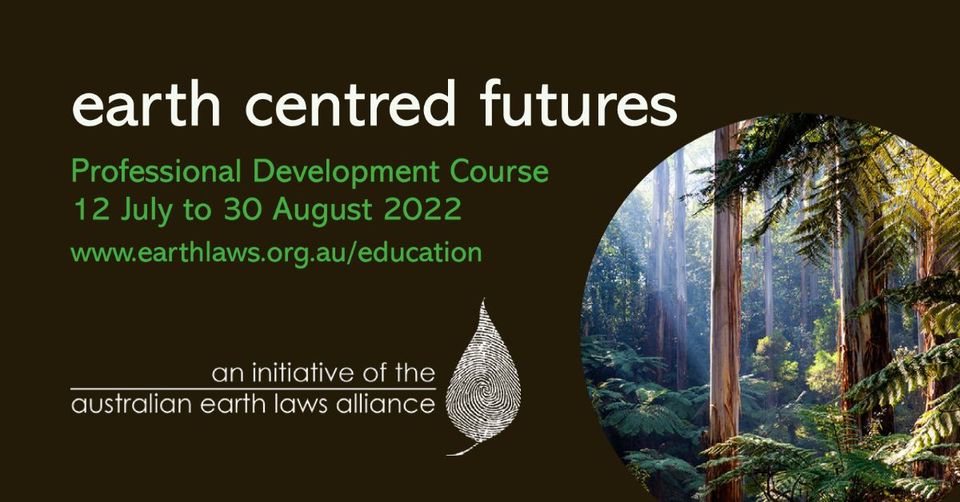
- Download the Course Outline here
- Facilitated by Dr Michelle Maloney and featuring experts from multi-disciplinary fields including Indigenous knowledge, western science, law, economics and policy.
- Who should attend? Everyone! This course is aimed at a general audience of practitioners and scholars who wish to learn about how to integrate ecocentric thinking and practice more effectively into their own work
- 8 week ONLINE course, from 12 July to 30 August, 2022
- Live classes will be held on Tuesdays from 5pm to 7pm Australian Eastern Standard Time (AEST)
- Live tutorials will be offered 4 times during the 8 week course, based on course participants’ availability
- All classes will be recorded for course participants
- Participants can choose to participate in assessment (entirely optional) to earn a digital badge and certificate from AELA
- For more information, contact us at aela@earthlaws.org.au
Introduction to Earth Laws
- Facilitated by Dr Michelle Maloney and featuring experts from legal fields including Earth jurisprudence, Rights of Nature, Ecocide, Indigenous First Laws and more
- Who should attend? Anyone who has an interest in Earth-centred governance and law. Lawyers, legal scholars and law students will find the course particularly beneficial, and will be able to claim Professional Development points from their relevant jurisdiction. Non-lawyers will also find the course beneficial, as it will enrich their knowledge and practice.
- 4 week ONLINE course, from 6th to 27th September, 2022
- Live classes will be held on Tuesdays from 5pm to 7pm Australian Eastern Standard Time (AEST)
- All classes will be recorded
- Participants can choose to participate in assessment (entirely optional) to earn a digital badge and certificate from AELA
- For more information, contact us at aela@earthlaws.org.au
ABOUT OUR SPEAKERS
Some of our guest speakers include:
- Adjunct Associate Professor Mary Graham – Adjunct Associate Professor, Political Science, University of Queensland and Kombu-merri and Waka Waka First Nations person
- Professor Will Steffen – Earth System and Climate Scientist – Climate Council and co-creator of the Planetary Boundaries framework
- Professor Brendan Mackey – Forest ecologist – Director of the Griffith Climate Action Beacon (Griffith University)
- Professor Robert Costanza – Ecological economist – Institute for Global Prosperity, University College London
- Professor Yin Paradies – Professor of Race Relations, Deakin University
- Mari Margil and Thomas Linzey – Legal Attorneys & Rights of Nature experts, Center for Democratic and Environmental Rights (United States)
- Maria Mercedes Sanchez – UN Harmony with Nature
- Dr Michelle Maloney, National Convenor, AELA
Prices
- $295 per person for people from not-for-profit and community organisations
- $495 per person, for people from government or the corporate sector
- Payment plans are available
- A limited number of scholarships are on offer
For more information, please visit www.earthlaws.org.au/education or email: aela@earthlaws.org.au
28. Planting brings back woodland birds
Connecting Country was heartened to recently discover some robust scientific research that supports our observations: revegetation with suitable indigenous plants really does bring back woodland birds! The new research was published in the Journal of Applied Ecology, and shows planting trees and shrubs brings woodland birds back to farms, from superb fairy-wrens to spotted pardalotes. The research was conducted by a team of respected academics, including Professor Andrew Bennett, who is a long-term friend of Connecting Country and helped design our bird monitoring program.
Connecting Country works with landholders and community groups to restore landscapes across the Mount Alexander region of central Victoria, with a focus on restoring habitat for woodland birds on both public and private land. Our key actions include fencing to protect remnant vegetation, changing grazing regimes, controlling pest plants and animals, planting revegetation and nurturing natural regeneration.
We focus on restoring woodlands and degraded landscapes for the benefit of our woodland birds and other wildlife. Through Connecting Country’s long-term bird monitoring program, we have a solid database that allows us to assess changes in woodland bird populations over time. Analysis indicates that our landscape restoration efforts are having a positive impact on woodland birds.
Revegetation of degraded woodlands is a key focus of Connecting Country (photo by Gen Kay)
The research also concluded that scattered trees are valuable habitat features for birds. These large old trees act as stepping stones that help birds move across the landscape, and provide foraging and nesting habitat for species such as Brown Treecreeper, Laughing Kookaburra and Eastern Rosella. They found individual patches of revegetation have the greatest value for birds when they include a diverse range of trees and shrubs, are close to or connected with native vegetation, and are older (meaning the plants have had more time to grow).
To read a news article about the research, courtesy of The Conversation website – click here
To read the full scientific article in the the Journal of Applied Ecology – click here
Connecting Country have been providing plants for landholder revegetation projects for over a decade (photo by Jacqui Slingo)
Posted by Connecting Country: https://connectingcountry.org.au/
29. Food for Thought
29.1 Planet Local – A Quiet Revolution This new film, created by Local Futures, is both a powerful critique of economic globalisation and a celebration of the kaleidoscope of grassroots initiatives that together form a growing movement for change: away from corporate rule towards the true democracy that more local markets make possible. Away from the screens of the mainstream media, the crude ‘bigger is better’ narrative that has dominated economic thinking for centuries is being challenged. As people work to protect and restore their local economies, their communities and the natural world, countless diverse initiatives are demonstrating a new path forward for humanity. It’s a path that localises rather than globalises, connects rather than separates, and shows us that human beings need not be the problem – we can be the solution.
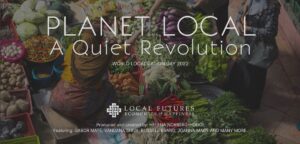
The film is built around edited presentations made for an event organised by Local Futures – World Localization Day – featuring prominent thinkers and activists from 6 continents, together with on-the-ground examples of localisation in action, the film highlights some key issues:
- The disproportionate power and influence exerted by a handful of giant multinational corporations
- The role of governments in supporting globalisation — through taxes, subsidies and regulations
- The madness of “redundant trade” that sees countries routinely importing and exporting identical quantities of identical products
- The crucial connection between localisation and diversity
- The role localisation can play in helping to rebuild community
- The political changes needed to move from here to there
- The “unstoppability” of localisation
Contributors to Planet Local – A Quiet Revolution include: Vandana Shiva, Russell Brand, Noam Chomsky, Helena Norberg-Hodge, Naomi Klein, Jane Goodall, Iain McGilchrist, Gabor Maté, Brian Eno, Jeremy Lent, and many others.
Produced and created by: Helena Norberg-Hodge
Written and directed by: Helena Norberg-Hodge, Henry Coleman and John Page
Creative direction: Nara Peek-Silva
Here’s the link to the trailer:
Note: A local screening of the film Planet Local- A Quiet Revolution will be held in Castlemaine in August or September including potential to form discussion groups. Localising Leanganook’s July e-news will provide more information.
29.2 Walking Together towards Makarrata
Makarrata = ‘coming together after a struggle, facing the facts of wrongs and living again in peace.’
NATIVE TITLE SINCE MABO- by Solway Nutting

Calls by First Nations groups for title to their never-ceded lands have been made since early colonisation. Locally, in the 1840s, the Protector Edward Stone Parker joined his voice to the Dja Dja Wurrung in calling for land rights at Franklinford. Two of the men leased acreage from Parker after the station was closed, but all the families had been moved to Corranderrk by the early 1860s. The handback of the Wave Hill station to the Gurindji people in 1975 was the first time the Commonwealth government had transferred Aboriginal land to its original owners.
Thirty years ago in June 1992, the High Court upheld the claim led by Meriam man Eddie ‘Koiki’ Mabo, along with David Passi and James Rice, that they held rights over the Murray Islands in the Torres Strait. The decision acknowledged the existence of Aboriginal law and custom prior to the establishment of the Australian nation, recognising First Nations’ connection to land and waters. After two centuries of injustice the earlier legal position that Australia was ‘terra nullius’ was now overruled.
A new set of laws, the Native Title Act (1993), was intended to ‘rectify past injustices’. The Act’s four objectives, besides recognition and protection of native title, included how future dealings would proceed and how claims would be determined. In the decade after the Mabo decision a series of High Court decisions tested the implementation of the Native Title legislation, as in the Yorta Yorta Decision of 2003. For many groups the claims test was hugely difficult, especially for those forcibly moved off their land. The test required proof they had existed as a society prior to British sovereignty, practising law and custom through to the present day.
In 1996, the High Court found that native title could co-exist with pastoral leases, but that where a pastoral lease and a native title right were inconsistent, the non-native title rights prevail. This controversial Wik decision led on to the government greatly extending the extinguishment regime, to their ‘ten-point plan’ and to the Native Title Amendment Act 1998.
The harsh intervention into Aboriginal communities in the Northern Territory Emergency Response, from 2007 to 2022, besides creating great hardship, anger and fear in the scores of townships affected, did not deliver culturally appropriate economic benefits for the communities.
The Australian Law Reform Commission report of 2015 recommended 30 changes to the Native title Act, to ‘refocus on the core elements of native title law, to facilitate an effective determination process’. The South West Native Title Settlement of 2018, described by some as ‘Australia’s First Treaty’, was approved by the Noongar Nation in Western Australia. They agreed to surrender certain native title rights in exchange for a comprehensive settlement package. The first time the High Court considered and confirmed how compensation under the Native Title Act should be assessed came in 2019. Called the Timber Creek Decision, it dealt with calculating compensation for economic and cultural loss arising from violation of native title rights.
About one third of Australia is now subject to some form of land tenure (including Native Title), often with co-existence or co-management agreement for land and waters between Indigenous and non-Indigenous groups. In Victoria, alternative agreement-making processes enable traditional owners to negotiate a ‘recognition and settlement agreement’.
The Mabo case had been an important step for the Australian legal system, but as yet, parts of our legal foundation as a nation are still tied to the colonial past. The limitations on resolving ‘unfinished business’ between the Australian State and First Nations peoples include the unfair burden of proof, non-exclusive title (limiting its economic utility), no recognition of the right to self-government, and the slowness, sometimes many years, for land claims to be resolved.
Principles of recognition, equality and justice are very much needed to redress the appalling disadvantages for First Nations people. The injustices and untruths that play such an insidious role are yet to be fully addressed.
Nalderun Education Aboriginal Corporation is a service that supports the Aboriginal Community, led by Aboriginal people. Many people and organisations in the Mount Alexander Shire contribute to Nalderun; the name is a Dja Dja Wurrung word meaning “all together”.
More information can be found at www.nalderun.net.au
29.3 Documentary encourages Repair- SCRAP

The Canadian film director Stacey Tenenbaum has just released SCRAP. This environmental documentary aims to raise awareness about a disposable culture’s environmental and social impact. It also encourages people to get involved in repair initiatives. Read more

![[ Random Image ]](https://leanganook.org/images/image_10.jpeg)
